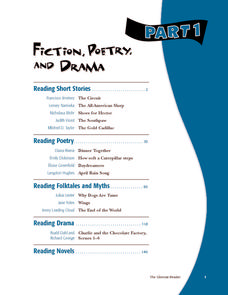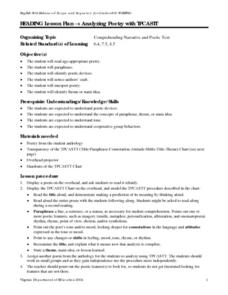K12 Reader
Will You Stay and Play?
Start off your day with a study of -ay words. Pupils can practice long a with -ay words by reading the brief poem included here. After they read, class members answer three reading comprehension questions right on the page.
K12 Reader
He Must Take the Bus
Build your youngsters' knowledge of the short /u/ sound with a quick exercise. Class members read a brief poem designed to include many words with the short /u/ sound and then answer three reading comprehension questions about the...
K12 Reader
The Spy Will Try Not to Cry
Learn all about the exploits of a sly spy from the short poem included on this resource. The poem, intended to provide practice with long /i/ words that use the letter y, is paired with three reading comprehension questions for pupils to...
K12 Reader
Feel the Green Grass
This poem may make your learners yearn for summer, but it will also help them practice the ee digraph. Pupils read the short poem, which includes many examples of the ee digraph, and respond to three reading comprehension questions.
Novelinks
The Adventures of Tom Sawyer: Biopoem
Explore characters in The Adventures of Tom Sawyer through biopoems. Pupils follow the specific formatting presented here to write 11-line poems about characters in the novel.
Curated OER
Kumeyaay Indians
Useful for literary analysis, citing textual evidence, or summary skills, this lesson about the Kumeyaay Indians would be a good addition to your language arts class. Middle schoolers read novels and summarize the literature in their own...
K12 Reader
Snack in the Sack
Get those -ack words straight with a quick exercise. Class members read a short poem that includes quite a few -ack words and then complete three reading comprehension questions.
K12 Reader
The Big Pig
Pigs are often big, but what else can your class find out about this particular pig? They'll learn a few things about it by reading the poem full of -ig words, and then answering the three reading comprehension questions.
K12 Reader
Drop the Mop!
Combine a study of -op words with a bit of reading comprehension. Learners read a quick a silly poem containing many -op words and then answer three questions.
K12 Reader
A Job for Bob
Get a handle on -ob words with a quick exercise. Learners first read a brief poem made up with many -ob words. They then response to three reading comprehension questions that are included on the page.
K12 Reader
Shut the Hut
Go with your gut and try out this worksheet that focuses on -ut words! Learners read a brief poem that includes many different words that end in -ut and then respond to three reading comprehension questions.
Curated OER
Fiction, Poetry, and Drama Part 1
Similar to a textbook, this resource includes multiple texts, plenty of explanation, lots of practice, and several graphic organizers. Use all of the materials, or pick and choose from such texts as "The Circuit," "Shoes for Hector,"...
Curated OER
Metaphor Meanings
Help your young writers decipher the literal meanings of metaphors. After reading several metaphors, learners write the real meanings that the phrases are describing. Use this resource in a figurative language lesson, or when preparing...
Scholastic
Defining Conflict Using "The Interlopers"
Feeling conflicted? Work out those issues with a language arts lesson on internal and external conflict. Using "The Interlopers" by Saki, class members identify the conflicts between the characters before writing their own short stories...
New York State Education Department
Comprehensive English Examination: June 2013
Tired of having to create your own formative assessments? Use a ready-made resource to assess listening and reading comprehension, essay writing, and literary skills. Scholars work through 28 questions in response to five different texts.
Curated OER
Breaking up a Poem
Seventh graders break down the barriers in reading, speaking, listening, writing and understanding poetry. As a whole group, they establish their own criteria for line breaks by discussing questions and taking notes on a PowerPoint...
Curated OER
Analyzing Poetry with TPCASTT
Middle schoolers read a poem and complete a TPCASTT chart. They make a prediction about the title (T) , paraphrase each line (P), identify poetic devices and nuances (C-connotation), explore mood and tone (A-attitude), point out shifts...
Curated OER
Poem in Your Pocket Day: Ideas for Celebrating
First instituted in New York City in 2002 and recognized nationwide in 2009, "Poem in Your Pocket Day" is part of National Poetry Month (April) and celebrates poetry in everyday life. A brief news story includes 9 ideas about how to...
Curated OER
Quirky Quatrain Poetry Lesson
Middle schoolers discover what a quatrain is, and are taught the three poetic devices: alliteration, hyperbole, and onomatopoeia. Everyone chooses a favorite hobby or activity, then attempts to write a poem about it. They must write two...
Curated OER
Calligrams
Poetry can inspire learners to create beautiful works of art. In this presentation, they are shown how to design calligrams, a type of poetry that uses words as art. This is a creative way to motivate learners to explore poetry.
Curated OER
Atmosphere and Symbolism in Poetry
Analyzing atmosphere and symbolism by focusing on a well-known poem, The Raven, is the strategy presented to writers in this presentation. Sorrow, darkness, and many other image words are used to help students question and analyze poetry...
Curated OER
Guided Reading: Three Little Pigs (Plus Wolf: Javalinas)
Guide your class through reading various versions of The Three Little Pigs. Talk about the traditional story line and then discuss a different point of view: Maybe the wolf was just an innocent bystander! This lesson plan, which has...
Curated OER
What is a Haiku? How Do You Write a Haiku?
Haiku poetry is explored in this language arts lesson. Yong readers identify the characteristics of haiku and read several examples. Students make connections between their study of Japan and the poetic form of haiku, and they write...
Curated OER
Plot/Poetry Review
Before a writer can create a well-composed piece, he/she needs to know the ropes. Review parts of speech, plot, and elements of poetry with this set of questions presented as a PowerPoint. The text, being white, is kind of difficult to...

























